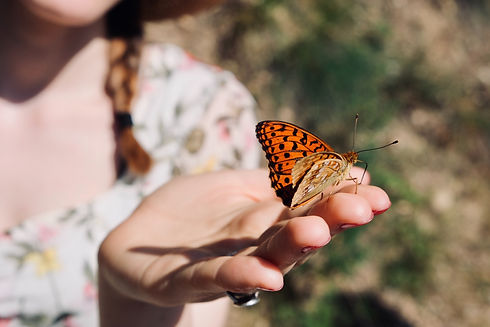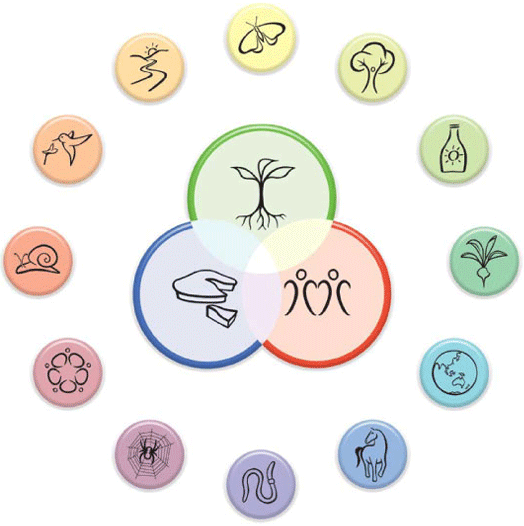PERMACULTURE
at INSPIRA
Some years ago, we discovered Permaculture, and decided to take a closer look. Since we did, we had the undeniable wish to dedicate our lives to projects supporting its philosophy and approach to living in harmony with nature. In a world where environmental consciousness is crucial, permaculture offers a pragmatic approach to sustainable living.

The term is derived from “permanent agriculture” (*) . A holistic approach that integrates ecological principles into every aspect of human life, a harmonic way to live WITH nature rather than trying to impose ourselves upon it, Permaculture offers a roadmap towards resilient and regenerative living.


EVERYONE CAN PLAY!
Before we "jump in the water" of this amazing topic, let us say that you don't need a farm to do Permaculture. One often postpones action on a project thinking one requires a lot of land, a garden, a farm! But in fact there are many ways to approach Permaculture and it can be done at many scales. I encourage you to explore and take action in your own life. You can create abundance for yourself, your community, and for generations to come. Here (and in our Blog) we will share a few ideas to get you excited too!

ATTEMPTIMNG A SHORT DEFINITION
Permaculture is a wide topic with many ways to approach it. But in simple terms:
-
It is first and foremost a design method based on whole-systems thinking for sustainable living and informed by ethical and design principles.
-
It’s based on the observation of the dynamics of nature in order to create an ecological and resilient coexistence between Earth and people. In the wild, ecosystems regenerate on their own and are self-maintaining. The idea is to mimic these natural processes and to do so in a way that we can cover our food and resources needs.
-
Its purpose is to develop holistic solutions, that can be used in agriculture, urban areas, buildings, technology, community systems, and even economics.
For us Permaculture includes a shift in our way of thinking. One where human development works in harmony with its environment.


PERMACULTURE DESIGN ETHICS & PRINCIPLES
Have you ever imagined to be, a responsible producer or contributor instead of only a dependent consumer? By adopting the ethics and applying permaculture principles in your daily life, you can make that transition, almost effortlessly. Building skills and resilience at home and in your local communities will help you and your family become more resilient in an era of uncertain changes.
While the techniques and strategies used to apply these principles vary widely (depending on the location, climatic conditions, and resources at hand), the foundations to this wholistic approach remain true. But first the basics:
-
3 Ethics of Permaculture Design:
-
12 Design Principles of Permaculture
3 PERMACULTURE DESIGN ETHICS
The 3 Ethics (along with the 12 Principles below) guide any decision-making, problem-solving, designing, interaction, observation, and reflection. Ultimately, it is a regenerative way of seeing and interacting with the natural world. They are:
-
Earth care
-
People care
-
Fair share (some people use Future care).
David Holmgren and Bill Mollison, the founders of the concept of Permaculture, chose these three ethics because they were the core ethics of all the longest-lasting civilizations. They believed that these ethics don’t just apply to gardening or agriculture but to all systems, economies, and social settings. The way we live, think, speak, and act.


12 PERMACULTURE DESIGN PRINCIPLES
The 12 Permaculture Design Principles guided by the 3 Ethics, are thinking tools, that, when used together, allow us to creatively re-design our environment and our behavior towards nature:
1. Observe and interact
2. Catch and store energy
3. Obtain a yield
4. Apply self-regulation & accept feedback
5. Use and value renewable resources & services
6. Produce no waste
7. Design from patterns to details
8. Integrate rather than segregate
9. Use small and slow solutions
10. Use and value diversity
11. Use edges and value the marginal
12. Creatively use and respond to change
To learn more about the 12 Principles of Permaculture and its 3 Ethics, visit the PermaculturePrinciples.com page.

WHAT WE ARE FOCUSING ON FIRST
Having gone through a couple of Permaculture courses is a fantastic experience. For the size of our farm, however, and given our little experience, we have the support of our Permaculture coach Marcus Pan, (his school is "Down to Earth" ), and spent some time last Winter designing our "master plan", which we are implementing through a number of projects. This helps us keep the work focused and manageable. Of course we will add more as we progress.
In terms of Permaculture, our initial focus is mainly on:
-
Soil health & regeneration, and water management.
Projects contributing to this are:-
Making of healthy soil or a sort of "Terra Preta" (soon more).
-
Making Swales and other Earth Works (Info on workshop we host November 2025)
-
our chicken team, that contributes with potent dropping donations, and preparing the ground for further productive gardens (soon more).
-
Efficient food production.
Projects contributing to this are:-
Besides the Food Forest, we have now a lovely Mandala Vegetable Garden. (soon more)
-
Our Olive grove. The farm already has 800 olive trees, 400 of which are in production and giving a top quality Olive Oil. (soon more)
-
In the coming months, we would like to add a small production of honey through setting up a couple of sustainable and naturalistic beehives. (soon more)
-
-
Helping biodiversity.
At the moment, a good portion of our land is left untouched and wild. Possibly next Winter we will create a Wilderness Forest, and a Medicinal Flowers Meadow. Of course, a small wild pond, and plenty of structures to provide housing to a large number of animals and insects. And, so many ideas still in the back-burner.

RESOURCES


Here some useful Permaculture related external resources
-
Permaculture Principles: Here you will find all the basics about permaculture: the principles, the ethics, the history. Each principle is explored in depth with dedicated articles and videos, and the site is available in English, French, Spanish and Portuguese.
PermaculturePrinciples.com -
Permaculture Garden Toolkit by Australian Morag Gamble: Blog and courses, gardening, homesteading, cooking, and so much more.
https://ourpermaculturelife.com/permaculture-garden-toolkit/ -
UK Permaculture Association: Thorough knowledge base with resources on just about every aspect of sustainable living, courses and events https://www.permaculture.org.uk/
-
Deep Green Permaculture: Australian blog and great resource for first-timers. Includes basics on sustainable gardening, DIY tips, etc. https://deepgreenpermaculture.com/
*****
FOOTNOTES
*1) Ecological researcher and writer, Bill Mollison and David Holmgren coined the term Permaculture in 1978, deriving it from Permanent Agriculture.



More
For more information, feel free to contact us.